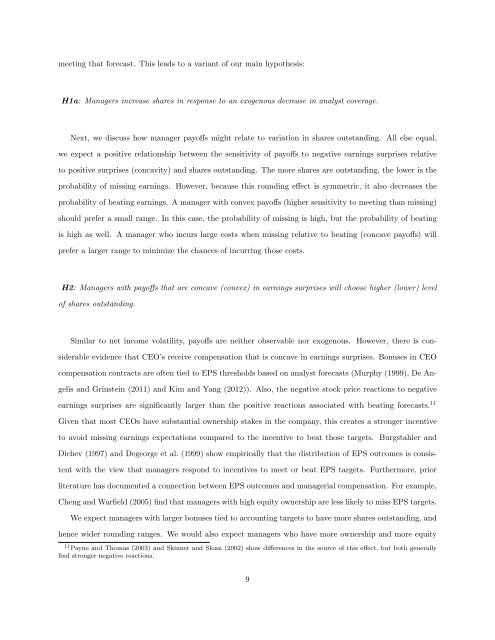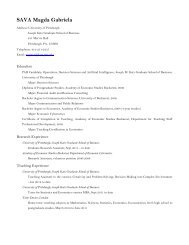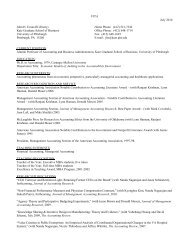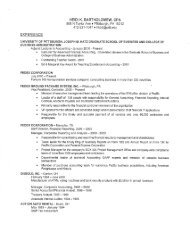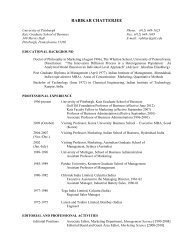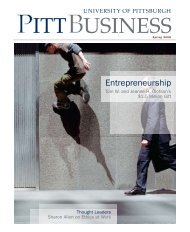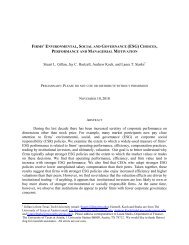Gaming the Float: How Managers Respond to EPS-based Incentives
Gaming the Float: How Managers Respond to EPS-based Incentives
Gaming the Float: How Managers Respond to EPS-based Incentives
You also want an ePaper? Increase the reach of your titles
YUMPU automatically turns print PDFs into web optimized ePapers that Google loves.
meeting that forecast. This leads <strong>to</strong> a variant of our main hypo<strong>the</strong>sis:<br />
H1a: <strong>Managers</strong> increase shares in response <strong>to</strong> an exogenous decrease in analyst coverage.<br />
Next, we discuss how manager payoffs might relate <strong>to</strong> variation in shares outstanding. All else equal,<br />
we expect a positive relationship between <strong>the</strong> sensitivity of payoffs <strong>to</strong> negative earnings surprises relative<br />
<strong>to</strong> positive surprises (concavity) and shares outstanding. The more shares are outstanding, <strong>the</strong> lower is <strong>the</strong><br />
probability of missing earnings. <strong>How</strong>ever, because this rounding effect is symmetric, it also decreases <strong>the</strong><br />
probability of beating earnings. A manager with convex payoffs (higher sensitivity <strong>to</strong> meeting than missing)<br />
should prefer a small range. In this case, <strong>the</strong> probability of missing is high, but <strong>the</strong> probability of beating<br />
is high as well. A manager who incurs large costs when missing relative <strong>to</strong> beating (concave payoffs) will<br />
prefer a larger range <strong>to</strong> minimize <strong>the</strong> chances of incurring those costs.<br />
H2: <strong>Managers</strong> with payoffs that are concave (convex) in earnings surprises will choose higher (lower) level<br />
of shares outstanding.<br />
Similar <strong>to</strong> net income volatility, payoffs are nei<strong>the</strong>r observable nor exogenous. <strong>How</strong>ever, <strong>the</strong>re is considerable<br />
evidence that CEO’s receive compensation that is concave in earnings surprises. Bonuses in CEO<br />
compensation contracts are often tied <strong>to</strong> <strong>EPS</strong> thresholds <strong>based</strong> on analyst forecasts (Murphy (1999), De Angelis<br />
and Grinstein (2011) and Kim and Yang (2012)). Also, <strong>the</strong> negative s<strong>to</strong>ck price reactions <strong>to</strong> negative<br />
earnings surprises are significantly larger than <strong>the</strong> positive reactions associated with beating forecasts. 11<br />
Given that most CEOs have substantial ownership stakes in <strong>the</strong> company, this creates a stronger incentive<br />
<strong>to</strong> avoid missing earnings expectations compared <strong>to</strong> <strong>the</strong> incentive <strong>to</strong> beat those targets. Burgstahler and<br />
Dichev (1997) and Degeorge et al. (1999) show empirically that <strong>the</strong> distribution of <strong>EPS</strong> outcomes is consistent<br />
with <strong>the</strong> view that managers respond <strong>to</strong> incentives <strong>to</strong> meet or beat <strong>EPS</strong> targets. Fur<strong>the</strong>rmore, prior<br />
literature has documented a connection between <strong>EPS</strong> outcomes and managerial compensation. For example,<br />
Cheng and Warfield (2005) find that managers with high equity ownership are less likely <strong>to</strong> miss <strong>EPS</strong> targets.<br />
We expect managers with larger bonuses tied <strong>to</strong> accounting targets <strong>to</strong> have more shares outstanding, and<br />
hence wider rounding ranges. We would also expect managers who have more ownership and more equity<br />
11 Payne and Thomas (2003) and Skinner and Sloan (2002) show differences in <strong>the</strong> source of this effect, but both generally<br />
find stronger negative reactions.<br />
9


